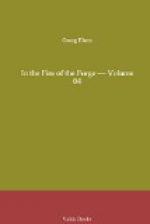As Siebenburg went downstairs he met his father-in-law on the second-story landing. Herr Casper, deadly pale, was clinging with his right hand to the baluster, pressing his left on his brow, as he vainly struggled for composure and breath. He had forgotten to strengthen himself with food and drink, and the terrible blows of fate which had fallen upon him during these last hours of trial crushed, though but for a short time, his still vigorous strength. The knight went nearer to help him, but when he offered Herr Casper his arm the old merchant angrily thrust it back and accepted a servant’s support.
While the man assisted him upstairs he repented that he had yielded to resentment, and not asked his son-in-law to try to discover Wolff’s hiding place, but no sooner had food and fiery wine strengthened him than his act seemed wise. The return of the business partner, without whose knowledge he had incurred great financial obligations, would have placed him in the most painful situation. The old gentleman would have been obliged to account to Wolff for the large sum which he owed to the Jew Pfefferkorn, the most impatient of his creditors, though he need not have told him that he had used it in Venice to gratify his love of gaming. How should he answer his son if he asked why he had rejected his betrothed bride, and soon after condescended to receive her again as his daughter and enter into close relations with her father? Yet this must be done. Ernst Ortlieb was the only person who could help him. It had become impossible to seek aid from Herr Berthold Vorchtel, the man whose oldest son Wolff had slain, and yet he possessed the means to save the sinking ship from destruction.
When the news of the duel reached him the messenger’s blanched face had made him believe that Wolff had fallen. In that moment he had perceived that his loss would have rendered him miserable for the rest of his life. This was a source of pleasure, for since Wolff had extorted his consent to the betrothal with Els Ortlieb, and thus estranged him from the Vorchtels, he had seriously feared that he had ceased to love him. Nay, in many an hour when he had cause to feel shame in the presence of his prudent, cautious, and upright partner, it had seemed as if he hated him. Now the fear of the judge whom he saw in Wolff was blended with sincere anxiety concerning his only son, whose breach of the peace menaced him with banishment—nay, if he could not pay the price of blood which the Vorchtels might demand, with death. Doubtless he had done many things to prejudice Wolff against his betrothed bride, yet he who had cast the first stone at her now felt that, in her simple purity, she would be capable of no repudiation of the fidelity she owed her future husband. However strongly he had struggled against this conviction, he knew that she, if any one, could make his son happy—far happier than he had ever been with the tall, slender, snow-white, unapproachable countess, who had helped bring him to ruin.




